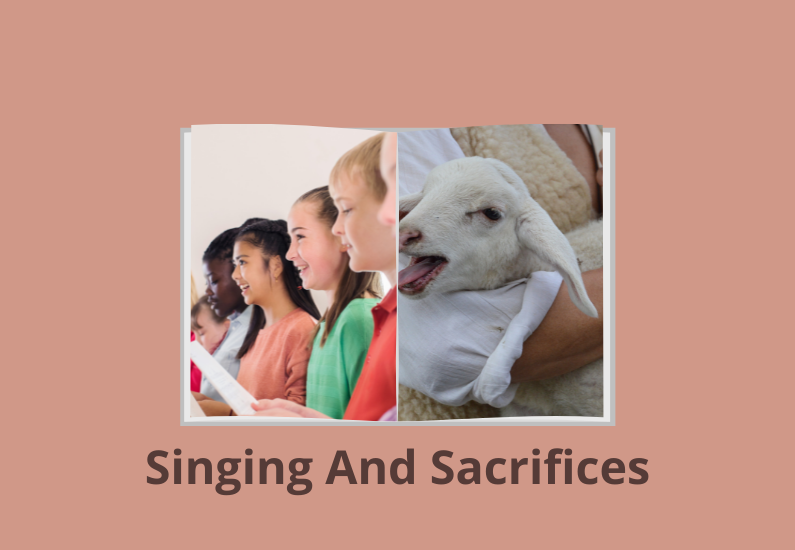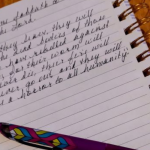I attended the singing school in Wilburton, OK this past week. It was a very uplifting week. The last day, a thought was presented that I hadn’t thought much about previously. It had to with our singing being a sacrifice to God. I know I’ve heard it said and have read it in the Bible but I had never really thought about what it meant to me as a Christian. The drive home from Wilburton (with everyone else in the car asleep except me) gave me a lot of time to contemplate the subject. Tomorrow night is our Ladies’ Bible Class. We should be working on marking our Bibles like we’ve done all summer but I want to present this to them instead. The general information and outline came from a class taught by Glenda Schales.
When we read about sacrifices in the Old Testament (the first few chapters of Leviticus), the first thing that becomes apparent is the meticulous rules that were involved in offering sacrifices. God wanted the best of everything. He said that if an offering was brought from the herd it should be a male without blemish, if an offering was brought from the flock it should be a male without blemish. The phrase without blemish just keeps popping up. It is very important to God that what they offered to Him was perfect. Not just the best they happened to have but an offering that had no blemish.
Just think about that a minute. There must have been a lot of preparation involved to consistently produce offerings that were without blemish. These offerings were not just offered once in a while. There were sacrifices being offered to God daily. These perfect animals had to come from somewhere. The flocks/herds had to be tended with great care. They had to be bred with skill to produce enough lambs or goats or cattle that had no blemish. They had to be cared for so they would not become injured and thus not acceptable as a sacrifice. This must have been a lot of work.
To be pleasing to God, the Israelites could not just send little Johnny outside to grab a lamb on the way to the sacrifice. The lambs (or cattle) must have been chosen well in advance of when they would have been needed. They must have known exactly which of their animals were going to be used to sacrifice to God and which were to be left for the family to consume. They could not leave this most important service of God to chance. The shame of not being prepared with a proper sacrifice must have been something no one wanted to face.
The Israelites were not instructed to do the best they could. They couldn’t say, “Well, I’m not very good at raising cattle so I’ll just bring the best I can.” God left no room for anything that wasn’t perfect. The sacrifice must be without blemish. I’m sure it was a monumental task that was on the Israelites’ minds all the time. They were always working towards the coming sacrifice they needed to offer.
Move forward a few hundred years to the days of King David (2 Samuel 24). David needed to offer a sacrifice to God but he was not home and had no place to sacrifice and nothing to offer as a sacrifice. The place and the offering were presented to David as a gift. David wanted no part of the gift. He said that he would purchase the land and everything he needed to offer the sacrifice. David did not want to offer a sacrifice to God that cost him nothing. He knew that for it to be a true sacrifice, he must give something up. He would not pass his responsibility on to someone else. He paid for it all from his own funds.
A sacrifice is giving something up. We sacrifice a lot of time and energy on our kids. That means we willing give up our time to help them grow to be the adults they need to be. In the same sense, we must sacrifice something to please God. In the Old Testament, the Israelites sacrificed the best of their flocks/herds. They gave God the best, no, not just the best, the perfect animals that they raised. In the New Testament we are instructed to sacrifice ourselves. We are living sacrifices (Heb 12). Our whole lives are to be lived as a sacrifice to God. We are to freely spend our money, our time and our talents to serve God. We are to give Him our hearts and our souls. We are to not hold anything back and we are not to give Him anything but the very best.
Look at the following passages:
Psalms 27:6 — And now my head shall be lifted up above my enemies all around me; Therefore I will offer sacrifices of joy in His tabernacle; I will sing, yes, I will sing praises to the Lord.
Psalms 107:22 — Let them sacrifice the sacrifices of thanksgiving, and declare His works with rejoicing.
Psalms 119:108 — Accept, I pray, the freewill offerings of my mouth O Lord…
Hebrews 13:15 — Therefore by Him let us continually offer the sacrifice of praise to God, that is, the fruit of our lips, giving thanks to His name.
Singing is a sacrifice, so….
Let’s prepare ourselves. We know that God wants the very best from His people. Let’s learn to give Him the very best. Let’s not be willing to accept anything less of ourselves because He will not accept anything less from us.
God has asked us to sing praises to Him with the ultimate instrument — our hearts/lips/voices. We must prepare our heart and mind to give the sacrifice of song. We must prepare our voice to sing our sacrifice.
Read Ephesians 5:19
speak to one another…
–We must both be there if we are to sing to one another. We can’t sing to someone who is not there and if we are not there, we can’t be sung to. This implies that at some point, we are going to get together and sing. We also must sing so that others can hear us. If we can’t be heard, then we are not singing to one another.
in psalms, hymns and spiritual songs…
–We can’t sing psalms, hymns and spiritual songs if we don’t know any. We must prepare ourselves by learning to sing psalms, hymns and spiritual songs. Thankfully, we live in a time when there are lots and lots of beautiful psalms, hymns and spiritual songs for us to sing but if we don’t learn them, we can’t sing them.
singing and making melody in your hearts…
–The instrument we use to sing is made by God. We don’t sing a sacrifice to Him with an inferior instrument anymore than the Israelites would offer an inferior animal for a sacrifice in the Old Testament. The voice is a perfect instrument. Any other, whether used for accompaniment or used alone is far inferior to what God has made for us. The human voice can be used any and everywhere. We are not limited to our worship being in Jerusalem as they were in Bible times. We are told we can worship anywhere. Our voices are with us wherever we go. We are always able to offer a sacrifice of song to God.
–Making melody in your heart literally means to pluck the strings of your heart. This implies an emotion that goes hand in hand with the voice. Songs can be sung with the right words and be in tune, but if they have no emotion (come from the heart) they are not acceptable to God. God wants us to worship Him from the heart.
to the Lord, giving thanks always for all things to God the Father in the name of our Lord Jesus Christ…
–All of this is directed toward God. Our sacrifice of singing is to be used to give thanks to God. Other passages say we are to praise God. God wants us to acknowledge Him and recognize that all that we have, all that we are is because of Him. In Acts 17, Paul tells the people of Athens, “God, who made the world and everything in it, since He is Lord of heaven and earth, does not dwell in temples made with hands, Nor is He worshiped with men’s hands, as though He needed anything, since He gives to all life, breath, and all things…for in Him we live and move and have our being.” We are to give God the glory for all things. One way He has instructed us to do this is in song.
How can we improve our sacrifice of singing?
Think about the words. The song God Is So God is a good one to look at. Read the words and really think about what they are saying. Many times we sing songs and spend so much time concentrating on all the notes and musical notations that the words tend to be an after thought. If we familiarize ourselves with the words, we can worship God with all our hearts.
God is so good,
God is so good,
God is so good,
He’s so good to me!
Jesus is real,
Jesus is real,
Jesus is real,
He’s so real to me!
He saved my soul,
He saved my soul,
He saved my soul and
He made me whole!
I praise His name,
I praise His name
I praise His name,
He’s so good to me!
It’s important that we learn the style of music we sing. God didn’t specify that we sing in four part harmony. In fact, the early church did not. Their singing was probably very different from ours. God left the specific style to our culture. Different parts of the world will use a different style than we do in the US.
Our western style of music is made up of rhythm, tone, tempo, etc. We have an 8 note scale that most of our music is based on. It can seem daunting to try to learn, but with a little practice can be mastered beautifully. Don’t forget the Israelites and how they had to produce perfect animals to sacrifice to God. If we are to sing a sacrifice it is going to take some work on our part.
Read the song again and this time try to feel the rhythm. Pretend like your rocking a baby as you read. The rocking motion when you rock a baby is the beat of the music. That is the rhythm. It’s not hard to find the rhythm, it’s just hard to read the notations we’ve come up with to let us know what the rhythm is. For now, just read the words and feel the rhythm.
Sing the melody (for those who have the Hymns For Worship it is song number 47). It is a very simple melody that fits very easily with the words. The first phrase just uses 3 notes. The next phrase moves those 3 notes up a step and so does the 3rd phrase. Then on the last phrase the music flows back down to the starting note. Anyone who really wants to improve their singing sacrifice should take the time to read the music. It is challenging, but can be done.
The other thing we need to do to improve our singing sacrifice is to learn what the song leader is doing. We have song leaders so we can all sing decently and in order. The song leaders style will vary greatly depending on the group he’s leading and his own ability. There are a couple of things any song leader should do. First, he should let you know what note you’re going to start on. If he doesn’t, he’s going to be singing the first couple of measures by himself and you’ll miss out on giving God that part of the sacrifice. We need to learn to listen for the beginning note.
The next thing any song leader should do is give you a beat pattern. The most important part of this beat pattern is getting everyone started. If he’s going to give the beat, the only way we’ll be able to start with him is if we are looking at him. We must look up and be prepared to sing with the song leader. This goes back to learning some psalms, hymns and spiritual songs. The more we know, the better our worship will be.
What can you do on your own to improve your singing sacrifice? You can listen to CDs with the music you’re wanting to learn. We live in a great time when these are readily available. Listen as your driving in your car, as your working in the house or wherever. Before you know it, you’ll be singing along and even singing on your own. Sing with others whenever possible. If you hear of a singing in your area, go to it. If you are having a singing in your home congregation, go to it. If you hear of people just getting together in their homes to sing, go with them. Have people in your own home to sing. Last of all, learn from others. If you have a weak area in singing, ask someone that can to help you. Take every opportunity to improve your worship to God. Never be satisfied with mediocrity. God expects the very best and we all need to give it to Him.
Now let’s sing God Is So Good to each other and to God.
How did you feel after singing the song?
Did you feel you had offered a sacrifice to God?
Did you talk to each other in song?
Did you feel encouraged?
One last scripture to encourage us all:
Psalms 47:6-7:
Sing praises to God, sing praises!
Sing praises to our King, sing praises!
For God is the king of all the earth;
Sing praises with understanding.
Diana Dow








If you find yourself in the OKCity area please let me know….It sounds like we are “kindred” spirits. Blessings, Ronda Duvall
Ronda, I would love to meet up with you sometime and pick your brain a little. You’ve got some wonderful ideas.